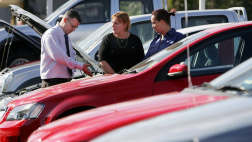….any financial assistance from the carbon tax.
Holden today says the cost to the three Australian-based car makers and the scores of component suppliers would be about $30 million a year.
But a report by accountancy firm PriceWaterhouseCoopers expects Australian car makers to share an annual impost of up to $84 million, resulting in a $400 jump in the prices of locally-made cars.
The accountancy firm says the carbon tax comes on top of a difficult period where the Australian car industry "struggled'' to compete.
In its industry report prior to this week's carbon tax announcement by the Federal Govrnment, the accountantcy firm warns that vehicle imports were on the rise and local jobs are under threat. It says that vehicle imports jumped to almost 85 per cent in 2010 compared with 60 per cent in 2002 and that new vehicles from Thailand doubled in two years.
Local manufacturers have also turned to importing components rather than sourcing from Australian suppliers. Component imports rose to 43.6 per cent in 2010-11 from 34.8 per cent in 2005-06, says PricewaterhouseCoopers.
“These challenges have resulted in a reduction in the sales volume of locally-manufactured vehicles and a reduction in local content of domestic-manufacturered vehicles as the vehicle asemblers have increasingly sourced components from overseas suppiers,'' the firm says.
“This has resulted in associated job losses within the Australian industry.'' Holden boss Mike Devereux in June says he expected the carbon tax would cost his company $40 million to $50 million a year at a rate of $20-$30 a tonne.
“It will increase the cost of doing business here and there probably ought to be some type of a (public-private) co-investment scheme to offset some of that cost,'' he told ABC Radio on June 27.
However, Holden today admits that ``while Holden designs, engineers and manufactures vehicles in Australia for the domestic and overseas market, it does not fit the Governments criteria as an emissions-intensive, trade-exposed industry (EITE).'' That is, no subsidy.
”Consequently, Holden and many other major manufacturers will only be potentially eligible to apply for compensation to partly off-set the impact on Australian manufacturing under the Clean Technology Program,'' Holden says in a statement.
“Over the coming days we will be reviewing the details of the scheme to better understand how the package will be implemented.
“In particular Holden will be discussing with the Government the issues affecting Australia's ability to compete globally for foreign investment.''







.jpg)
.jpg)
.jpg)

.jpg)


.jpg)
.jpg)




Comments